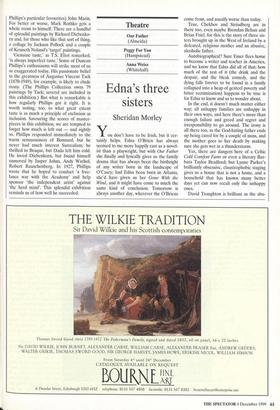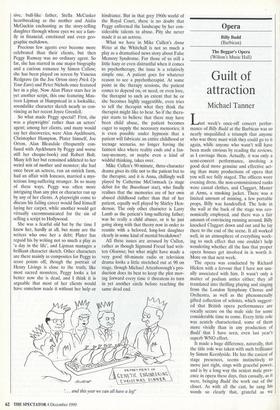Theatre
Our Father (Almeida) Peggy For You (Hampstead) Anna Weiss (Whitehall)
Edna's three sisters
Sheridan Morley You don't have to be Irish, but it cer- tainly helps. Edna O'Brien has always seemed to me more happily cast as a novel- ist than a playwright, but with Our Father she finally and lyrically gives us the family drama that has always been the birthright of any writer born in the landscape of O'Casey; had Edna been born in Atlanta, she'd have given us her Gone With the Wind, and it might have come to much the same kind of conclusion. Tomorrow is always another day, wherever the O'Briens
come from, and usually worse than today.
True, Chekhov and Strindberg are in there too, even maybe Brendan Behan and Brian Friel, for this is the story of three sis- ters brought up in the West of Ireland by a defeated, religious mother and an abusive, alcoholic father.
Autobiographical? Sure Emer flees home to become a writer and teacher in America, and we know that Edna did all of that; how much of the rest of it (the drink and the despair, and the bleak comedy, and the dying falls forever to be found in a family collapsed into a heap of genteel poverty and bitter recrimination) happens to be true is for Edna to know and us to wonder about.
In the end, it doesn't much matter either way; all unhappy families are unhappy in their own ways, and here there's more than enough failure and greed and regret and irresponsibility to go around. The irony is all there too, as the God-hating father ends up being cared for by a couple of nuns, and the mother goes to her death by making sure she gets wet in a thunderstorm.
Yes, there are dangers here of a Celtic Cold Comfort Farm or even a literary Bar- bara Taylor Bradford; but Lynne Parker's brilliantly obsessive, claustrophobic staging gives us a house that is not a home, and a household that has known many better days yet can now recall only the unhappy ones.
David Troughton is brilliant as the abu- sive, bull-like father, Stella McCusker heartbreaking as the mother and Aislin McGuckin enchanting as the story-telling daughter through whose eyes we see a fam- ily in financial, emotional and even geo- graphic meltdown.
Precious few agents ever become more celebrated than their clients, but then Peggy Ramsay was no ordinary agent. So far, she has starred in one major biography and a curious romance by Simon Callow; she has been played on screen by Vanessa Redgrave (in the Joe Orton story Prick Up Your Ears) and Peter Nichols once featured her in a play. Now Alan Plater stars her in yet another script, this one featuring Mau- reen Lipman at Hampstead in a lookalike, soundalike character sketch nearly as con- vincing as her recent Joyce Grenfell.
So what made Peggy special? First, she was a playwrights' rather than an actors' agent; among her clients, and many would say her discoveries, were Alan Ayckbourn, Christopher Hampton, Plater himself, Joe Orton, Alan Bleasdale (frequently con- fused with Ayckbourn by Peggy and worse still her cheque-book) and Robert Bolt. Many left her but remained addicted to her weird mix of mother and monster; she had once been an actress, run an ostrich farm, had an affair with lonesco, married a mys- terious long-suffering stranger. In so many of these ways, Peggy was often more intriguing than any plot or character run up by any of her clients. A playwright come to discuss his failing career would find himself laying her carpet, while another would get virtually excommunicated for the sin of selling a script to Hollywood.
She was a fearful old bat by the time I knew her, hardly at all, but many are the writers who owe her a debt; Plater has repaid his by writing not so much a play as 'a day in the life', and Lipman manages a brilliant character sketch. Other characters are there mainly as composites for Peggy to score points off, though the portrait of Henry Livings is close to the truth; like most sacred monsters, Peggy looks a lot better now she is dead, and I think it is arguable that most of her clients would have somehow made it without her help or hindrance. But in that grey 1960s world of the Royal Court, there is no doubt that Peggy enlivened the landscape by her con- siderable talents to abuse. Pity she never made it as an actress.
What we have in Mike Cullen's Anna Weiss at the Whitehall is not so much a play as a dramatised news story about False Memory Syndrome. For those of us still a little hazy or even distrustful when it comes to psychotherapy, the issue is a relatively simple one. A patient goes for whatever reason to see a psychotherapist. At some point in the therapy sessions, the patient comes to depend on, or need, or even love, the therapist to such an extent that he or she becomes highly suggestible, even tries to tell the therapist what they think the therapist might like to hear. So if the thera- pist starts to believe that there may have been child abuse, the patient becomes eager to supply the necessary memories; it is even possible under hypnosis that a patient will fabricate an entire childhood or teenage scenario, no longer having the faintest idea where reality ends and a fan- tasy-memory, or maybe even a kind of wishful thinking, takes over.
Mike Cullen's 90-minute, three-character drama gives its title not to the patient but to the therapist, and it is Anna, chillingly well played by Catherine McCormack (a stage debut for the Braveheart star), who finally realises that the memories are of her own abused childhood rather than that of her patient, equally well played by Shirley Hen- derson. The only other character is Larry Lamb as the patient's long-suffering father; was he really a child abuser, or is he just going along with that theory now in order to reunite with a beloved, long-lost daughter clearly in some kind of mental breakdown?
All these issues are aroused by Cullen, rather as though Sigmund Freud had writ- ten Oleanna; but what might have made a very good 60-minute radio or television drama looks a little stretched out at 90 on stage, though Michael Attenborough's pro- duction does its best to keep the plot mov- ing forward every time it threatens to turn in yet another circle before reaching the same dead end.
. and this year we can all have a legl'



















































































 Previous page
Previous page